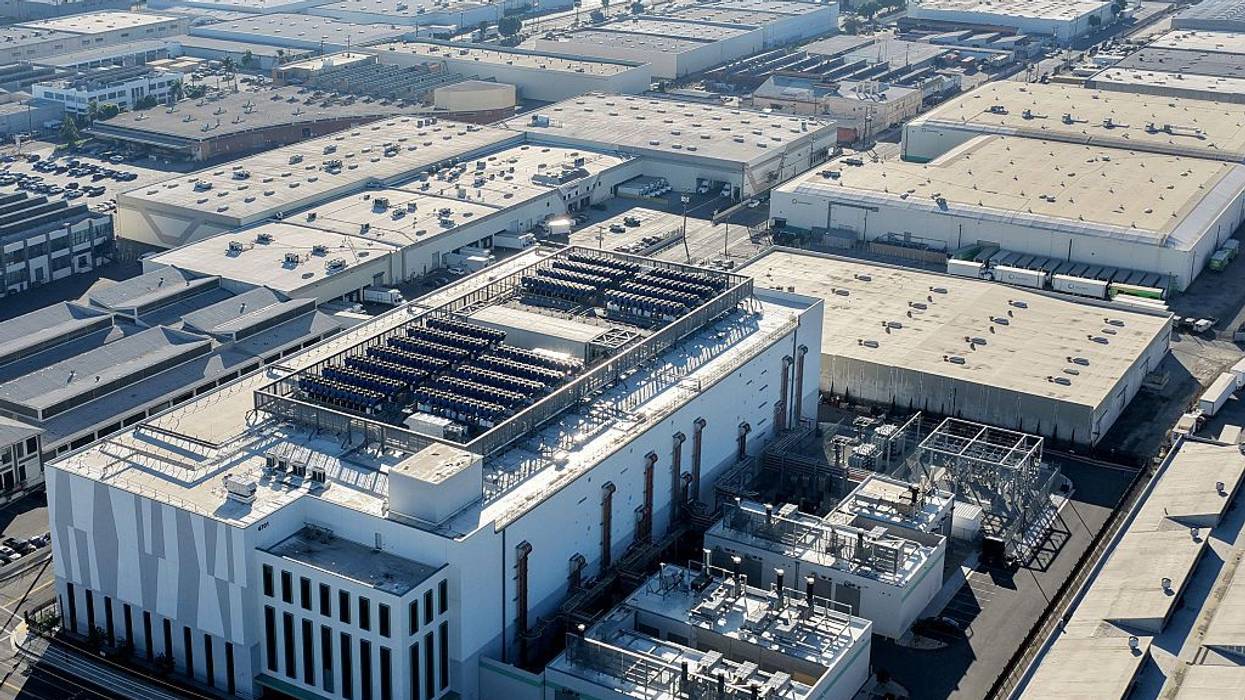Sen. Bernie Sanders (I-Vt.) today delivered remarks on the floor of the U.S. Senate in opposition to the COMPETES Act, which includes $53 billion in giveaways to very profitable microchip companies.
Sanders' remarks, as prepared for delivery, are below:
M. President: At a time of massive and growing income and wealth inequality, the American people are outraged at the unprecedented level of corporate greed that is taking place all around them.
Today, while the working class of this country is struggling with higher gas prices, higher food prices and higher housing prices, the billionaire class and large corporations are doing phenomenally well and have never had it so good.
In America today, while the average worker is making $44 a week less in inflation based dollars than he or she made nearly 50 years ago, corporate profits are at an all-time high and CEOs have seen huge increases in their compensation packages. We have never seen in this country the level of corporate greed that we are seeing right now.
Let me give you just a few examples: While the price of gas is now $4.25 a gallon, on average, Exxon Mobil, Chevron, BP and Shell made nearly $30 billion in profits last quarter alone. Meanwhile, big oil CEOs are on track to spend $88 billion this year not to produce more oil, not to address the climate crisis, but to buy back their own stock and hand out dividends to enrich their wealthy shareholders.
And here's more corporate greed. Amazon raised the price of its prime membership by 16.8%, while it increased its profits by 75% to a record-breaking $35 billion - and, by the way, avoided $5.2 billion in taxes. Meanwhile, the founder of Amazon, Jeff Bezos, became $81 billion richer during the pandemic and is now worth $186 billion.
More corporate greed. The price of beef is up 32%, the price of chicken is up 20% and the price of pork is up 13%. Meanwhile, Tyson Foods, a major producer of chicken, beef and hot dogs, increased its profits by 140% last quarter to $1.1 billion and gave its CEO a 22% pay raise last year to $14 million. Meanwhile, its owner, John Tyson, nearly doubled his wealth during the pandemic and now is now worth $3 billion.
Here's corporate greed and the outrageous cost of prescription drugs. Last year Pfizer, Johnson & Johnson and AbbVie - three giant pharmaceutical companies - increased their profits by over 90% to $54 billion. Meanwhile, the CEOs of just 8 prescription drug companies made $350 million in total compensation in 2020.
When we talk about corporate greed we are also talking about massive levels of income and wealth inequality.
In our country today, the two wealthiest people own more wealth than the bottom 42 percent of our population - more than 130 million Americans. And the top one percent now owns more wealth than the bottom 92 percent.
Since the Wall Street crash of 2008, about 45% of all new income has gone to the top 1%. In other words, over the last many decades there has been a massive shift in income and wealth from the middle class and working families to the top one percent.
And listen to this, which really says it all. During this terrible pandemic, when thousands of essential workers died, gave up their lives doing their jobs, over 700 billionaires in America became nearly $2 trillion richer. 700 people, $2 trillion richer.
So, this is where we are today. Desperate workers are dying because they are forced to go to work to provide for their families, while the people on top are doing unbelievably well. Today, billionaires like Elon Musk, Jeff Bezos and Richard Branson are zooming off to outer space, buying $500 million super-yachts and mansions with 25 bathrooms. Is that really what America is supposed to be about?
We are talking now, appropriately, about the Russian oligarchy. Well, what do you think we have here now in this country? It's an American oligarchy.
M. President, the American people want us in Congress to take action to address this unprecedented level of corporate greed.
They are sick and tired of large corporations making record profits and, in a given year, paying nothing in federal income taxes.
They are sick and tired of billionaires paying a lower effective tax rate than a teacher, a nurse, a truck driver or a firefighter.
They want Congress to address corporate greed and make sure that the wealthiest people and most profitable corporations pay their fair share of taxes.
And yet, this week, what are we doing here in the Senate? We are debating legislation to provide some $53 billion in corporate welfare with no strings attached to the highly profitable micro-chip industry. And yes, if you can believe it, this legislation also provides a $10 billion bailout to Jeff Bezos so that his company Blue Origin can launch a rocket ship to the moon.
M. President, in terms of the micro-chip industry, let us be very clear.
We are talking about an industry that has shut down over 780 manufacturing plants in the United States and eliminated 150,000 American jobs over the last 20 years while moving most of its production overseas.
In other words, in order to make more profits, these companies shut down plants in America and hired cheap labor abroad. And now, believe it or not, these very same companies are in line to receive $53 billion in corporate welfare to undo the damage that they did.
Do we need to expand the enormously important microchip industry in this country so that we become less dependent on foreign nations? Absolutely. But we can accomplish that goal without throwing money at these companies with no protections for the taxpayer.
M. President, we are the only major country on earth that does not guarantee healthcare to all Americans. Apparently, our people are not "entitled" to that.
We have the highest child poverty rate of almost any major nation on earth, which has gone up by 41% since January because of the refusal of some to extend the Child Tax Credit.
Apparently, our working parents are not "entitled" to raise their kids in dignity.
We have 45 million Americans struggling with student debt because of the outrageous cost of higher education. Apparently, our young people are not "entitled" to quality education without undergoing financial distress.
But here we are today on the floor of the Senate because many of my colleagues think that the enormously profitable micro-chip industry is entitled to a massive amount of corporate welfare.
M. President, I suspect 5 major semi-conductor companies will likely receive the lion's share of this taxpayer handout: Intel, Texas Instruments, Micron Technology, Global Foundries, and Samsung.
These 5 companies made over $75 billion in profits last year.
The company that will likely benefit the most from this taxpayer assistance is Intel. Let's be clear. Intel is not a poor company. It is not going broke.
In 2021, Intel made nearly $20 billion in profits.
We're talking about a company that had enough money to spend $14.2 billion during the pandemic, not on research and development, but on buying back its own stock to reward their executives and wealthy shareholders.
We're talking about a company that could afford to give its CEO, Pat Gelsinger, a $116 million compensation package last year.
We're talking about a company that could afford to spend over $100 million on lobbying and campaign contributions over the past 20 years.
We're talking about a company whose CEO in 2003, Andy Grove, said that he had "no choice" but to continue to move jobs overseas as he predicted that the U.S. would lose the bulk of its information technology jobs to China and India - which we have.
Do we really think that a highly profitable corporation like Intel needs a taxpayer bailout worth many billions of dollars with no strings attached?
Another company that will receive taxpayer assistance under this legislation is Texas Instruments.
Last year, Texas Instruments made $7.8 billion in profits. In 2020, this company spent $2.5 billion buying back its own stock while it has outsourced thousands of good-paying American jobs to low-wage countries and spent more than $40 million on lobbying over the past 20 years.
And on and on it goes.
M. President, providing $53 billion in corporate welfare to an industry that has outsourced tens of thousands of jobs to low-wage countries and spent hundreds of billions on stock buybacks with no strings attached may make sense to some, but it does not make sense to me.
Now, M. President, I understand that there will be a major effort to pass this bill as quickly as possible in order to move it to a conference committee and send it to the President's desk.
But let me be very clear. I will not support any Unanimous Consent request to speed up the passage of this bill unless I receive a roll call vote on two amendments that I have introduced.
The first amendment would prevent microchip companies from receiving taxpayer assistance unless they agree to issue warrants or equity stakes to the Federal Government.
If private companies are going to benefit from over $53 billion in taxpayer subsidies, the financial gains made by these companies must be shared with the American people, not just wealthy shareholders. In other words, all this amendment says is that if these companies want taxpayer assistance, we are not going to socialize all of the risks and privatize all of the profits. If these investments turn out to be profitable as a direct result of these federal grants, the taxpayers of this country have a right to get a return on that investment.
M. President. This is not a radical idea. These exact conditions were imposed on corporations that received taxpayer assistance in the bipartisan CARES Act, which passed the Senate 96 to 0.
In other words, every Member of the U.S. Senate has already voted for the conditions that are in this amendment.
Further, the CARES Act was not the first time that Congress passed warrants and equity stakes tied to government assistance. During the 2008 financial crisis, Congress required all companies taking TARP funds to issue warrants and equity stakes to the Federal Government.
In addition, this amendment would also require these highly profitable companies not to buy back their own stock, not to outsource American jobs, not to repeal existing collective bargaining agreements and to remain neutral in any union organizing effort.
Again this is not a radical idea. All of these conditions were imposed on companies that received funding from the CARES Act and passed the Senate by a vote of 96-0.
The second amendment that I have introduced would simply eliminate the $10 billion bailout for Jeff Bezos to fly to the moon. If Mr. Bezos wants to go to the moon, good for him. He has $186 billion in personal wealth. He became $81 billion richer during the pandemic. He is the second richest person in America. And, in a given year, Mr. Bezos has paid nothing in federal income taxes.
If he wants to go to the moon, let him use his own money, not U.S. taxpayers.
I yield the floor.





